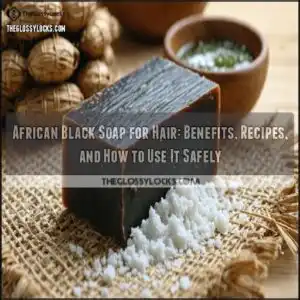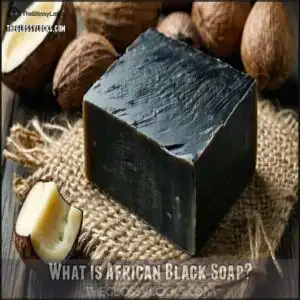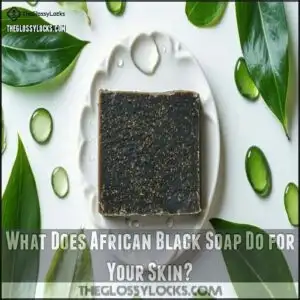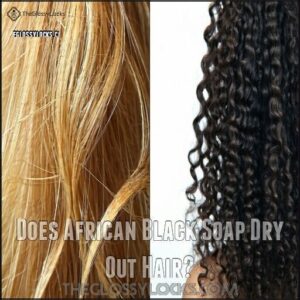This site is supported by our readers. We may earn a commission, at no cost to you, if you purchase through links.

It’s like giving your hair a fresh start without the harsh chemicals. Many users report less dandruff, reduced itchiness, and more manageable locks after switching.
You can use it as a shampoo by dissolving a small piece in water—a little goes a long way! The soap’s natural glycerin helps retain moisture, making it especially beneficial for curly and textured hair types.
Wait until you discover its secret hair growth benefits! African black soap is a great way to achieve a healthy hair routine.
Table Of Contents
- Key Takeaways
- What is African Black Soap?
- What Does African Black Soap Do for Your Skin?
- How to Use African Black Soap
- What is Black Soap?
- Does African Black Soap Dry Out Hair?
- How to Make African Shampoo Out of Black Soap
- Is African Black Soap Safe for Hair?
- Frequently Asked Questions (FAQs)
- How to use black soap for hair shampoo?
- Does hair blackening soap work?
- What does leaving soap in your hair do?
- What are the Benefits of African Black Soap on Hair?
- What Types of African Black Soap are Available?
- What Should I Avoid When Using African Black Soap?
- How Often Should I Use African Black Soap on Hair?
- How Should I Store African Black Soap?
- How often should African Black Soap be used?
- Can it treat specific scalp conditions?
- Conclusion
Key Takeaways
- African black soap is a natural hair cleanser made from plant ingredients like plantain ash and shea butter that removes buildup without stripping your scalp’s natural oils.
- You’ll need to dilute the soap properly before use – mix small soap shavings with warm water and use just once weekly to prevent dryness.
- For best results, always follow with moisturizing oils or conditioner after washing to maintain your hair’s natural moisture balance.
- Beyond cleansing, African black soap helps combat dandruff, reduces itchiness, and contains vitamins A and E that nourish your scalp and promote healthier hair growth.
What is African Black Soap?
African Black Soap is a centuries-old treasure from West Africa, crafted from natural ingredients like plantain peels, cocoa pod ash, and shea butter.
This traditional recipe varies by region, with each family adding their unique touch. You’ll find it’s packed with vitamins A and E, fatty acids, and minerals that nourish your scalp and strands.
Unlike commercial soaps, raw black soap contains no harsh chemicals—just pure, natural goodness. Its rich cultural origins in Ghana and Nigeria reflect generations of wisdom passed down through families.
The soap’s key properties include gentle cleansing while maintaining your hair’s natural moisture balance, which is a result of its natural ingredients and cultural origins, making it a great choice due to its pure, natural goodness.
What Does African Black Soap Do for Your Skin?
Your skin’s about to throw you a thank-you party once you start using African black soap, which naturally fights bacteria while gently exfoliating dead skin cells without stripping away essential moisture.
You’ll notice clearer, more balanced skin as the soap’s unique blend of plant ash and oils tackles everything from acne to razor bumps, making your daily shower feel like a mini spa treatment for your largest organ.
Removes Bacteria
One of the standout powers of African black soap lies in its impressive bacteria-fighting abilities.
When massaged onto your scalp, this natural wonder works like a microscopic cleaning crew, sweeping away harmful bacteria that can cause infections and irritation.
Its antimicrobial properties come from plantain ash and cocoa pod, creating a natural antibacterial shield for your scalp health.
Unlike harsh chemical cleansers, black soap scalp treatments gently eliminate unwanted microbes without disrupting your skin’s natural balance.
Your scalp will thank you for this soap’s remarkable efficacy and its ability to provide a natural solution, making it a great alternative to harsh chemical treatments, with its natural wonder working to keep your scalp healthy.
Deep Cleans Your Skin
Every pore on your skin deserves a fresh start, which is exactly what African Black Soap delivers through its remarkable deep cleansing action.
Here’s the blockquote you requested in the same engaging tone as the paragraph:
African Black Soap: your skin’s reset button, giving every pore the fresh start it deserves.
When used on your scalp, this natural cleanser works beyond the surface to:
- Flush out stubborn oil buildup that commercial shampoos often leave behind
- Eliminate toxins that accumulate from environmental exposure and styling products
- Unclog pores on your scalp to promote healthier hair follicles
- Prevent acne and folliculitis by removing bacteria that cause inflammation
- Balance your scalp’s natural oils without the harsh stripping effect of clarifying shampoos
The soap’s unique composition of plantain ash and natural oils creates the perfect balance—tough enough for deep cleansing but gentle enough to preserve your scalp’s moisture barrier.
It’s like sending your scalp to a spa!
Exfoliates to Help Improve Skin Texture and Tone
While many commercial exfoliants contain harsh chemicals, African black soap offers a gentle yet effective natural alternative for improving both skin texture and tone.
The unique combination of plantain ash and cocoa pod powder creates a mild exfoliating action that removes dead skin cells without irritating your scalp.
With regular use, you’ll experience:
- Enhanced cell turnover that reveals fresher, healthier skin underneath those flaky patches (goodbye, dandruff!)
- Balanced oil production that helps manage both dry and oily areas of your scalp
- Gradual tone enhancement as dark spots and uneven patches become less noticeable
You’ll love how this black soap shampoo leaves your scalp feeling clean but not stripped. It’s like giving your head a mini facial every wash day! The texture improvement happens naturally as black soap’s exfoliation benefits work their magic, making it perfect for sensitive conditions like eczema.
Reduces or Prevents Razor Burn
Beyond improving skin texture, African Black Soap works wonders for preventing razor burn.
The soap’s natural oils soften hair follicles, creating the perfect canvas for a smooth shave.
You’ll notice fewer ingrown hairs and less irritation thanks to its soothing ingredients like shea butter and plantain ash.
When used as pre-shave prep, this natural cleanser creates a protective barrier that minimizes friction while shaving, leaving your skin calm and comfortable post-shave, with the overall effect being a significant reduction in razor burn.
Helps With Mild Skin Rashes
Many people find African black soap works wonders for mild skin rashes, thanks to its powerful natural ingredients.
The combination of shea butter, coconut oil, and plantain ash helps calm irritation while reducing redness on affected areas.
Whether you’re dealing with black soap eczema or trying to manage psoriasis symptoms, application methods matter – gently massage a small amount onto damp skin, let it sit for 30 seconds, then rinse thoroughly.
The soap’s anti-inflammatory properties tackle rash severity at the source instead of just masking symptoms.
For best results, follow with post-wash care using a light moisturizer, as black soap benefits extend beyond just cleaning – it’s like giving your troubled skin a soothing hug while eliminating irritants, providing a sense of troubled skin relief and promoting overall skin health with its natural ingredients.
How to Use African Black Soap
After discovering the skin benefits of African black soap, you’re probably wondering how to use this natural hair cleanser properly. Working with this powerhouse ingredient is simpler than you might think!
- Start with dilution methods – mix small soap shavings with warm water to create your natural shampoo base
- Master application techniques by working the lather gently into your scalp using fingertips, not nails
- Focus on rinsing thoroughly to prevent residue buildup that can make hair feel stiff
- Don’t skip moisturizing afterwards with oils or conditioner to balance the cleansing effect
Remember, less is more—use this black soap hair treatment just once weekly. It also helps to stimulate hair follicle growth with key nutrients.
What is Black Soap?
You’ll find that African black soap is a natural cleanser made from plant ash, oils like shea butter and coconut oil, and botanical extracts that’s been used for centuries in West Africa.
It’s packed with vitamins A and E, antioxidants, and minerals that nourish your scalp and hair without the harsh chemicals that can make your locks throw a tantrum, providing a natural and gentle cleansing experience.
How Do You Choose The Right One?
Now that you know what African black soap is, let’s tackle the million-dollar question: how do you pick the right one for your hair.
Choosing authentic African black soap can feel like finding a needle in a haystack, but I’ve got you covered.
The key to selecting the right soap lies in understanding what to look for, which can be summarized in the following criteria:
| Criteria | What to Look For | What to Avoid |
|---|---|---|
| Ingredients | Raw shea butter, plantain ash, cocoa pods | Dyes, fragrances, synthetic additives |
| Texture | Soft, crumbly, uneven shape | Hard, uniform, perfectly shaped bars |
| Sourcing | Fair-trade, single-origin, ethical brands | Mass-produced knockoffs, vague origins |
For sensitive scalps, stick with fragrance-free options. If you’ve got dry hair, look for soap enriched with extra shea butter. Remember, your hair needs should drive your choice.
Many people are now buying authentic black soap online.
How Should It Be Used?
Almost every African Black Soap enthusiast will tell you: proper application is key to revealing its hair-nourishing magic.
To use it effectively:
- Dilution methods: Mix 1 tablespoon of soap with 1 cup of warm water to create a gentle DIY shampoo that won’t strip your hair.
- Application frequency: Limit usage to once weekly for dry hair, twice for oily scalps – I learned this lesson after my hair felt like straw from overuse!
- Scalp massage: Work the lather in circular motions for 2-3 minutes to stimulate blood flow.
- Rinse techniques: Use cool water for a thorough rinse, followed by your favorite conditioner.
For best results, pair with moisturizing product pairings like shea butter-based conditioners after washing to maintain your hair’s natural oils.
Regular use can stimulate hair follicle growth, according to some studies.
Does African Black Soap Dry Out Hair?
While African black soap can leave your hair feeling squeaky clean, it might also strip away essential oils if you’re not careful.
You’ll want to add moisturizing ingredients like shea butter or coconut oil to your DIY soap mixture to prevent the dreaded "straw hair" effect that has sent many natural hair enthusiasts running back to commercial products.
What Makes African Black Soap So Soft?
Unlike regular soaps that leave your hair feeling like straw, African Black Soap offers a uniquely soft texture that’s gentle on your locks. This softness isn’t magic—it’s science.
The secret lies in the perfect balance of ingredients. When traditional artisans craft this soap, they carefully control several factors:
| Component | What It Does For Softness |
|---|---|
| Shea Butter Content | Creates creamy texture and deep moisture |
| Oil Infusion | Coconut and palm oils add slip and smoothness |
| Water Content | Proper hydration prevents hardening |
| Aging Process | Extended curing develops gentle properties |
| Glycerin Retention | Natural glycerin isn’t removed like in commercial soaps |
Your hair responds beautifully to these natural elements. The rich shea butter penetrates strands while the perfect ingredient ratios guarantee the soap won’t strip away natural oils.
Think of it as nature’s conditioner in soap form—it cleanses while maintaining your hair’s delicate moisture balance.
Probability of African Black Soap Causing Dryness
African Black Soap occasionally causes dryness in hair, despite its wealth of natural ingredients.
Your hair’s moisture balance depends largely on how you use this powerful cleanser.
To maintain proper hair moisture when using black soap:
- Monitor your hair porosity – high porosity hair may need less frequent application
- Adjust soap concentration – dilute it more for sensitive scalps
- Follow with moisturizing oils like shea or coconut to restore oil balance
- Limit usage frequency to once weekly for most hair types
"I thought my curls would hate black soap," shares Tiana, "but when I rinse thoroughly and follow with a deep conditioner, my hair feels amazing!"
Remember, even moisturizing black soap requires proper technique to avoid drying effects.
African Black Soap Shampoo Recipe
With just a few DIY ingredients, you can transform African black soap into a nourishing homemade shampoo that won’t strip your hair.
Here’s how to whip up this natural beauty solution in your kitchen:
| Ingredient | Amount | Benefit | Storage Method | pH Balancing |
|---|---|---|---|---|
| African black soap | 1/3 of 3oz bar | Gentle cleansing | Cut into small pieces | Naturally balanced |
| Warm water | 1 cup | Dissolves soap | Cool before adding oils | Neutral |
| Sweet almond oil | 1 tbsp | Adds moisture | Helps prevent dryness | Conditioning |
| Tea tree oil | 5-7 drops | Scalp benefits | Antimicrobial | Soothing |
| Vitamin E oil | 1/2 tsp | Preserves mixture | Extends shelf life | Nourishing |
Shake your mixture well before each use, as ingredients may separate. A little goes a long way—just a small amount creates rich lather!
Store your black soap recipe in the fridge between uses to keep it fresh. For those interested, there are products available online to simplify the process. Your scalp will thank you for this natural treat!
How to Make African Shampoo Out of Black Soap
Creating your own African black soap shampoo transforms ordinary hair care into a nourishing ritual with ancient roots.
Here’s how to craft this natural cleanser:
- Shave 1/3 of a 3oz black soap bar into a mason jar with warm water
- Add moisturizing elements like sweet almond oil and glycerin to balance the soap’s deep cleansing properties
- Mix in beneficial oils such as argan, neem, or lavender essential oil
- Store your DIY creation in the refrigerator and bring to room temperature before use
Don’t worry about the watery texture—this homemade remedy works wonders without the thickness of commercial products. It also helps to stimulate hair follicle growth for a healthier scalp.
Is African Black Soap Safe for Hair?
Yes, African Black Soap is generally safe for hair, but there are five important factors that matter.
Your hair porosity and scalp sensitivity are key when using this natural hair care option.
While it effectively removes buildup without leaving residue, proper dilution is vital to prevent excessive dryness.
The black soap ingredients (like shea butter and palm oil) have antimicrobial properties that benefit your scalp, but watch for potential ingredient allergies.
For best results, use it just 2-3 times weekly and always follow with a conditioner.
To choose wisely, consider your hair’s curl pattern and porosity.
The long-term effects? Healthier hair that won’t throw a tantrum when you wash it!
Frequently Asked Questions (FAQs)
How to use black soap for hair shampoo?
To use black soap for hair, simply mix soap shavings with warm water until dissolved.
Add oils like jojoba or argan to prevent dryness, then massage into wet hair and scalp.
Rinse thoroughly.
Does hair blackening soap work?
Looking for a magical hair-darkening potion?
Traditional African black soap isn’t actually designed to blacken hair, but it cleanses and nourishes your scalp wonderfully.
You’ll need specific hair dyes for color changes instead.
What does leaving soap in your hair do?
Leaving soap in your hair can strip away natural oils, causing dryness and irritation.
It’ll leave residue that weighs down your locks and might trigger scalp itchiness.
Always rinse thoroughly after washing!
What are the Benefits of African Black Soap on Hair?
African black soap nourishes your scalp with vitamins A and E, fights dandruff with natural antifungal properties.
It promotes healthy growth while cleansing without stripping natural oils.
It’ll leave your hair stronger and shinier!
What Types of African Black Soap are Available?
You’ll find both raw, traditional African black soap and commercial varieties blended with other ingredients.
There’s also liquid African black soap, bar soap, and specialty formulations for hair care with added oils.
What Should I Avoid When Using African Black Soap?
Avoid overusing African black soap as it can dry out your hair.
Don’t skip oils in DIY recipes, use undiluted, or mix with harsh ingredients.
Always follow with a good conditioner.
How Often Should I Use African Black Soap on Hair?
You should use African black soap on your hair 1-2 times weekly.
It’s gentle enough for regular use but can dry your hair if overused.
Always follow with conditioner and oils, using African black soap is crucial for hair care.
How Should I Store African Black Soap?
Store your black soap in a dry, ventilated container away from water.
You’ll want to keep it on a wooden dish or in a sealed bag between uses to prevent melting and extend its life.
How often should African Black Soap be used?
Wondering about that perfect balance?
You can use African Black Soap 1-2 times weekly for normal hair or 2-3 times monthly for dry hair.
Listen to your hair’s needs and adjust accordingly, this means finding the perfect balance.
Can it treat specific scalp conditions?
African Black Soap effectively treats dandruff, psoriasis, eczema, and scalp acne.
Its antifungal and antibacterial properties soothe inflammation while gentle exfoliation removes dead skin cells.
You’ll notice relief after just a few uses, with African Black Soap being the key to this improvement.
Conclusion
Imagine Sarah, who struggled with dry, frizzy hair for years until she discovered African black soap.
You’ve now got all the tools to transform your haircare routine with this natural wonder! Whether you’re making a DIY shampoo or using it to combat dandruff, African black soap for hair offers incredible benefits without harsh chemicals.
It’s gentle, effective, and versatile for all hair types.
Ready to give your locks the TLC they deserve? Your hair will thank you!








